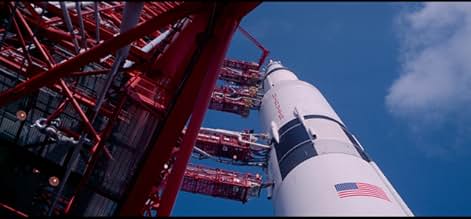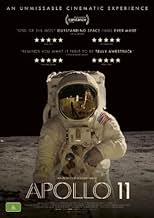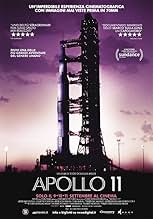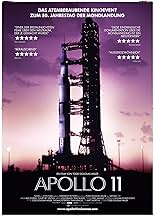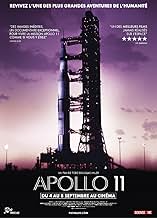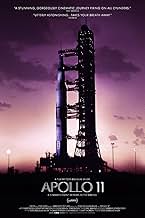AVALIAÇÃO DA IMDb
8,1/10
28 mil
SUA AVALIAÇÃO
Repaso na missão Apollo 11 liderada pelo comandante Neil Armstrong e pelos pilotos Buzz Aldrin e Michael Collins.Repaso na missão Apollo 11 liderada pelo comandante Neil Armstrong e pelos pilotos Buzz Aldrin e Michael Collins.Repaso na missão Apollo 11 liderada pelo comandante Neil Armstrong e pelos pilotos Buzz Aldrin e Michael Collins.
- Ganhou 3 Primetime Emmys
- 59 vitórias e 44 indicações no total
Neil Armstrong
- Self - Mission Commander
- (cenas de arquivo)
Mike Collins
- Self - Command Module Pilot
- (cenas de arquivo)
Buzz Aldrin
- Self - Lunar Module Pilot
- (cenas de arquivo)
- (as Edwin 'Buzz' Aldrin)
Deke Slayton
- Self - Director of Flight Crew Operations
- (cenas de arquivo)
Clifford E. Charlesworth
- Self - Flight Director Green Team
- (cenas de arquivo)
Bruce McCandless II
- Self - Capsule Commuicator (CAPCOM) Green Team
- (cenas de arquivo)
- (as Bruce McCandless)
Charles Duke
- Self - Capsule Communicator (CAPCOM) White Team
- (cenas de arquivo)
Gene Kranz
- Self - Flight Director White Team
- (cenas de arquivo)
Jim Lovell
- Self - Backup Commander
- (cenas de arquivo)
John F. Kennedy
- Self - President of the United States of America
- (cenas de arquivo)
Janet Armstrong
- Self
- (cenas de arquivo)
Patricia Mary Finnegan
- Self
- (cenas de arquivo)
Andy Aldrin
- Self
- (cenas de arquivo)
Joan Ann Archer
- Self
- (cenas de arquivo)
- (não creditado)
Walter Cronkite
- Self
- (cenas de arquivo)
- (não creditado)
Lyndon B. Johnson
- Self
- (cenas de arquivo)
- (não creditado)
Avaliações em destaque
"Apollo 11" (2019 release; 93 min.) is a documentary about the Apollo 11 mission. As the movie opens, we are informed it is "July 16, 1969" and a mere 3 hours away from the launch. We get full-color footage of the enormous crowds 15 mi. away from the launching pad. Meanwhile, through a quick photo montage, we get a quick glimpse at the three astronauts' life, as they are getting their space suits on. The TV commentator meanwhile talks about "the burdens and hope they carry for all mankind". It is then time for the astronauts to be driven to the Apollo. At this point we are then 10 min. into the movie.
Couple of comments: this documentary is directed and edited by Todd Douglas Miller. There have been many documentaries about the Apollo 11 mission before, so what sets this one apart? Several things: first and foremost, during the collaboration between the film makers and NASA, never before seen 70 mm full color footage was unearthed. That, combined with previously available 16 mm and 32 mm footage allowed the film makers to present this story in a way never before experienced. Frankly, words are not enough. The astronauts' elevator ride up to the top of the Apollo space ship (over 300 ft. tall) finally give a sense of how freaking high that is. Second, the film makers decided to use no voice-over or narrator, and instead let the TV commentary and the internal NASA discussions do all of the talking. Third, there is a fabulous electronic score, courtesy of composer Matt Morton. And get this: Morton used only instruments that were around at the time of Apollo 11's trip to the moon in July, 1969, including including the Moog modular Synthesizer IIIc, the Binson Echorec 2, and the Mellotron. Wow, just wow. When you combine all of these elements, it makes for outright compelling viewing. Even though we of course know the outcome, I nevertheless STILL felt tense as I was watching all of this unfold.
You may or may not be aware that Neil Armstrong spent the last 40 years of his life here in Cincinnati (where I live), including teaching at the University of Cincinnati. Upon his retirement, he became an even more private person than he already was, and public appearances were rare. I had the great fortune of seeing him narrate the "Lincoln Portrait" at a Cincinnati Pops performance in 2009, and the outpouring of love, respect and affection from the public for this true American hero made the hairs stand on my arms. Meanwhile, "Apollo 11" is an unforgettable movie experience, and highly recommended!
*UPDATE Jan 13, 2020* This past weekend I saw an edited version of the film called "Apollo 11 - First Steps Edition" at the Omnimax theater of the Cincinnati Museum Center. It is the exact same footage as in the original film, cut down to 45 min. so as to fit the IMAX/Omnimax schedules. I was incredibly excited beforehand, as I thought this would be true Imax/Omnimax footage, but alas, that is not the case. It's as before but projected on the half-dome screen that is the Omnimax. Still very enjoyable, and I love, LOVE the original score by Matt Morton blasting away in an Omnimax setting.
Couple of comments: this documentary is directed and edited by Todd Douglas Miller. There have been many documentaries about the Apollo 11 mission before, so what sets this one apart? Several things: first and foremost, during the collaboration between the film makers and NASA, never before seen 70 mm full color footage was unearthed. That, combined with previously available 16 mm and 32 mm footage allowed the film makers to present this story in a way never before experienced. Frankly, words are not enough. The astronauts' elevator ride up to the top of the Apollo space ship (over 300 ft. tall) finally give a sense of how freaking high that is. Second, the film makers decided to use no voice-over or narrator, and instead let the TV commentary and the internal NASA discussions do all of the talking. Third, there is a fabulous electronic score, courtesy of composer Matt Morton. And get this: Morton used only instruments that were around at the time of Apollo 11's trip to the moon in July, 1969, including including the Moog modular Synthesizer IIIc, the Binson Echorec 2, and the Mellotron. Wow, just wow. When you combine all of these elements, it makes for outright compelling viewing. Even though we of course know the outcome, I nevertheless STILL felt tense as I was watching all of this unfold.
You may or may not be aware that Neil Armstrong spent the last 40 years of his life here in Cincinnati (where I live), including teaching at the University of Cincinnati. Upon his retirement, he became an even more private person than he already was, and public appearances were rare. I had the great fortune of seeing him narrate the "Lincoln Portrait" at a Cincinnati Pops performance in 2009, and the outpouring of love, respect and affection from the public for this true American hero made the hairs stand on my arms. Meanwhile, "Apollo 11" is an unforgettable movie experience, and highly recommended!
*UPDATE Jan 13, 2020* This past weekend I saw an edited version of the film called "Apollo 11 - First Steps Edition" at the Omnimax theater of the Cincinnati Museum Center. It is the exact same footage as in the original film, cut down to 45 min. so as to fit the IMAX/Omnimax schedules. I was incredibly excited beforehand, as I thought this would be true Imax/Omnimax footage, but alas, that is not the case. It's as before but projected on the half-dome screen that is the Omnimax. Still very enjoyable, and I love, LOVE the original score by Matt Morton blasting away in an Omnimax setting.
The film starts the morning of launch day July 16, 1969. There are no actors, no reenactments, no narrator. It is 100% restored archival footage and recorded audio, most of which I had never seen before. Opening footage of the crowds gathering around Kennedy Space Center gave you the sense it was apparent to everyone the magnitude of what was about to happen.
They had audio and video of (an issue I won't spoil, something during launch prep I had never heard of before). Obviously there is no external footage of the spacecraft from the time it leaves earth orbit until it arrived at the moon but the editing and coverage used are excellent and you never feel like you're in the dark or missing out.
There is no attempt made at politicizing the event or manipulating the viewer, it is raw, factual cinéma vérité. Although I did find Kennedy's speech moving, they made the excellent choice to NOT show the famous portion we've all heard about landing a man on the moon and returning him safely by the end of the decade. It was the rest of that speech, which I'm not sure I'd ever heard, that was astute, prophetic and even funny at one point.
My one very minor caution is that viewers who aren't already aware how critical/dangerous some maneuvers were could miss out on the gravity of the situation. The filmmakers do assist with this with the score, which is absolutely fantastic (and according to the credits, composed entirely with instruments available in July '69), and some minor on-screen graphics (e.g. FUEL 30 seconds, 1202 alarm). It's a trivial concern but viewers who are familiar with the space program in general, and this mission in particular, will get the most out of the experience.
The film wraps up after our astronauts are safely home and cleared from quarantine. During the credits there are a few more interesting shots of some of the celebrations.
They had audio and video of (an issue I won't spoil, something during launch prep I had never heard of before). Obviously there is no external footage of the spacecraft from the time it leaves earth orbit until it arrived at the moon but the editing and coverage used are excellent and you never feel like you're in the dark or missing out.
There is no attempt made at politicizing the event or manipulating the viewer, it is raw, factual cinéma vérité. Although I did find Kennedy's speech moving, they made the excellent choice to NOT show the famous portion we've all heard about landing a man on the moon and returning him safely by the end of the decade. It was the rest of that speech, which I'm not sure I'd ever heard, that was astute, prophetic and even funny at one point.
My one very minor caution is that viewers who aren't already aware how critical/dangerous some maneuvers were could miss out on the gravity of the situation. The filmmakers do assist with this with the score, which is absolutely fantastic (and according to the credits, composed entirely with instruments available in July '69), and some minor on-screen graphics (e.g. FUEL 30 seconds, 1202 alarm). It's a trivial concern but viewers who are familiar with the space program in general, and this mission in particular, will get the most out of the experience.
The film wraps up after our astronauts are safely home and cleared from quarantine. During the credits there are a few more interesting shots of some of the celebrations.
I had the chance to see an advance screening of the movie in Vienna, during a meeting of the UN Committee on the Peaceful Uses of Outer Space and the word that best sums it all up is "WOW". It is wonderful to be able to witness all the work that went into a momentous achievement. There is the great moment we all know, the "one step for a man, a giant leap for mankind" moment. But this movie pays a much-deserved tribute to all those men and women who joined efforts to make this possible. Fantastic.
Saw the Apollo 11 IMAX film last night. Highly recommend. No narration just the NASA announcer, communications between ship and ground plus a few other bits added such as Walter and JFK now and then. Images are amazing, esp in IMAX. It moves well, no slow moments, no soap opera, no agenda, lots of unseen footage and some new stories, pure documentary, the trip is the whole story. PDI is great, TLI is great, LM separation, footage of the crowd is great. Go see, you wont be disappointed. 90 minutes long.
Todd Douglas Miller's documentary Apollo 11 is a rich buffet of restored footage, clever image juxtaposition, and ingenious lip reading. There is SO MUCH newly-released footage, one gets the impression that 1/4 of the mission weight must've been cameras and film! Where have these images been for fifty years? There's no narration... just sounds and voices from the mission, peppered with occasional contemporaneous commentary from Walter Cronkite's legendary broadcasts. The film is a beautiful, visceral thrill ride, lovingly constructed, without aggrandizement... yet emotions soar. This is what America once was, and what it could be again, and I absolutely do not mean that in any jingoistic sense. Truly our finest moment. See it in IMAX if you can - IT IS WORTH IT.
Você sabia?
- CuriosidadesSeveral of the recordings captured by the astronauts during the mission are featured in this documentary. These recordings by Neil Armstrong, Buzz Aldrin and Mike Collins earned them honorary memberships in the American Society of Cinematographers.
- Erros de gravaçãoThe incident involving Buzz Aldrin's bio-med sensors going out, leading him to crack wise, saying, "I promise I will let you know if I stop breathing," occurred during the return voyage, on day 8 of the mission, but is depicted (at approx 48 minutes into the film) as happening during the approach to the moon before the separation of the command and lunar modules.
- Citações
Neil Armstrong: One small step for man... one giant leap for mankind.
- Versões alternativasIn 2019, an edited version of the film, cut down to 45 minutes for exhibition in museum IMAX theaters, was released as Apollo 11: First Steps.
- ConexõesFeatured in WatchMojo: Top 10 Best Movies of 2019 (So Far) (2019)
- Trilhas sonorasMother Country
Written and Performed by John Stewart
Principais escolhas
Faça login para avaliar e ver a lista de recomendações personalizadas
Detalhes
- Data de lançamento
- País de origem
- Centrais de atendimento oficiais
- Idioma
- Também conhecido como
- Apollo 11: First Steps
- Locações de filme
- Sea of Tranquility, The Moon, Space(Apollo 11 landing site)
- Empresas de produção
- Consulte mais créditos da empresa na IMDbPro
Bilheteria
- Faturamento bruto nos EUA e Canadá
- US$ 9.039.891
- Fim de semana de estreia nos EUA e Canadá
- US$ 1.607.040
- 3 de mar. de 2019
- Faturamento bruto mundial
- US$ 15.343.649
- Tempo de duração
- 1 h 33 min(93 min)
- Cor
- Mixagem de som
- Proporção
- 2.20 : 1
Contribua para esta página
Sugerir uma alteração ou adicionar conteúdo ausente






